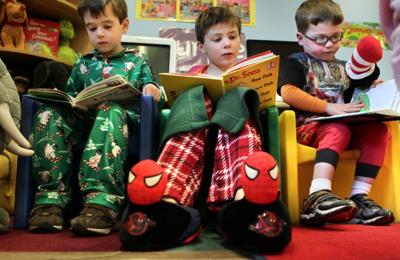JEFFERSON CITY — Missouri lawmakers have banned educators from leaning on a model of reading instruction called the “three-cueing” method as part of a bipartisan education package signed this week by Gov. Mike Kehoe.

Kindergarten and first-grade students at Miriam School celebrated the birthday of Dr. Seuss at this pajama party held in 2011.
The law mandates that three cueing, which teaches students to read using context clues, can be used to supplement lessons, but phonics should be the majority of instruction.
State Rep. Ed Lewis, a Moberly Republican and sponsor of the legislation, told The Independent that the law builds on prior legislative efforts and work from the Missouri Department of Elementary and Secondary Education.
“We’ve come to the realization that phonics is crucial,” Lewis said. “The three-cueing system, when used as the primary source, evidence shows a decrease in the amount of learning that occurs, and for that reason, we want to use it less.”
People are also reading…
Three cueing is widely criticized for encouraging kids to make guesses when reading and doesn’t show how to sound out words, which is important for understanding complicated texts.
Missouri isn’t the only state to ban three cueing. By the end of 2024, at least 11 states had explicitly banned the method.
The problem with three cueing, which once was lauded as an alternative to phonics, came to public attention when American Public Media reporter Emily Hanford investigated reading instruction and later launched the podcast series “Sold a Story.”
The series armed those backing the “science of reading” in a longstanding war between phonics instruction and context-clue-based models and state laws followed — including a literacy bill passed in Missouri in 2022.
The 2022 legislation required state education officials to create a teacher preparatory course on literacy. DESE, in turn, launched its “Read, Lead, Exceed” initiative, including instruction for educators.
As of this spring, 429 school districts and over 8,600 educators have had training in Language Essentials for Teachers of Reading and Spelling, or LETRS.
“It is pretty intense training,” Missouri Education Commissioner Karla Eslinger told The Independent. “It creates an opportunity for the teachers to use that science of reading, that evidence-based best practices on how you teach reading.”
The training and other science-backed materials provided by the department are not mandatory but participation has been encouraging, Eslinger said.
She expects elementary literacy rates to rise as a result of the training and other efforts since 2022, like literacy coaches the department hired.
With a charge to ban three cueing as the primary form of reading instruction, Eslinger said the department will continue to push best practices.
“We are not going to police this,” she said. “We are going to show good practice and give support to good practice, so it just bolsters what we’re doing.”
As part of a checklist school districts provide annually to the department, they will be required to confirm that they are not using three cueing as a primary instructional model.
“The work that our literacy teams are doing in the state is all being very well received. (Educators) are wanting more and more,” Eslinger said. “It is not because it is mandated, it is because it works.”
Post-Dispatch photographers capture tens of thousands of images every year. See some of their best work that was either taken in June 2025 in this video. Edited by Jenna Jones.












